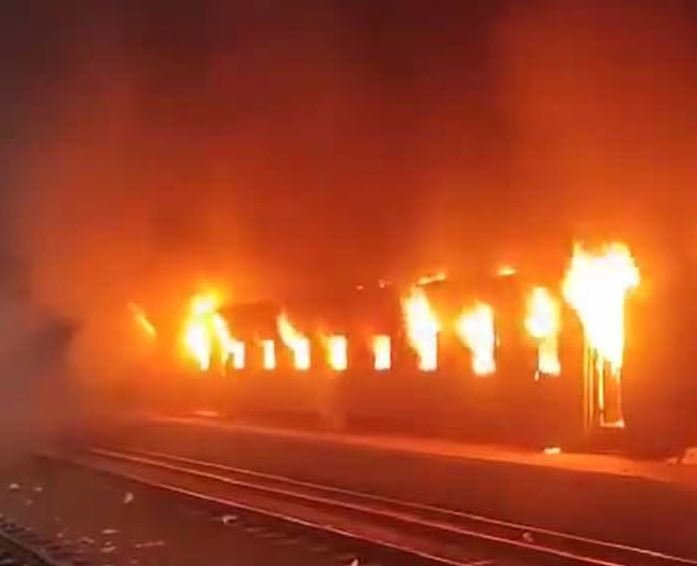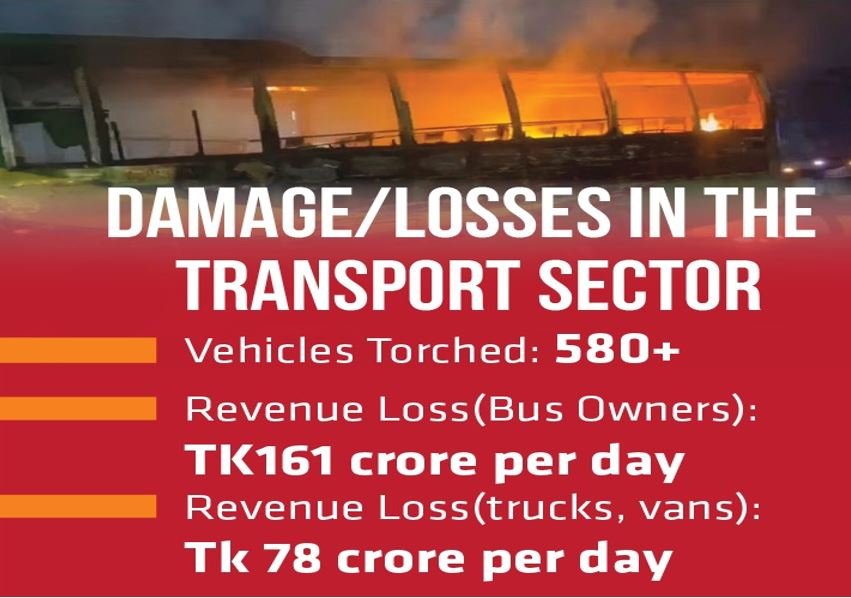As BNP-Jamaat’s nation-wide strikes encountered a surprising lack of resonance for people’s rejection, the vested quarter now desperately elevated sabotage attacks on public properties like rail tracks to terrorize the country.
Amidst the 11th phase of BNP-Jamaat’s nation-wide blockade on Wednesday (December 13), A man,35, was killed and 10 others were injured as a train derailed on a section of the Dhaka-Mymensingh rail line in Gazipur where the tracks were damaged by suspected BNP-Jamaat supporters.
You Can Also Read: BNP’s Descent into Legal Quagmire
The deceased was identified as Aslam, 35, a poultry businessman from Gafargaon upazila of Mymensingh.
Seven coaches of the Dhaka-bound Mohanganj Express, including the locomotive, veered off the tracks at Bankhuria around 4:00am, said Gazipur Fire Service Deputy Director Abdullah Al Arefin.
The saboteurs cut the tracks with gas cutters sometime in the night, Al Arefin said.
Train services between Dhaka and Mymensingh were halted following the derailment.
The fire service recovered a 12-kg gas cylinder from the forest beside the railway tracks, which could be used in the sabotage activity.
“This was a big sabotage. Thousands of people could have died,” an eyewitness said.
Gazipur district administration formed a five-member investigation committee, led by Additional District Magistrate Humayun Kabir to probe the incident.
Additionally, a seven-member investigation committee has been formed by the railways.
Both committees have been assigned the task of investigating and presenting their reports within the next three working days.
Major Yasir Arafat Hossain, commander of RAB-1 Gazipur Porabari camp said that stern action will be taken soon against whoever involved with the incident.
On November 16 this year, BNP-Jamaat’s assailants have set ablaze a commuter train stationed at Tangail’s Gharinda Railway Station.

From January 5 to February 17, 2015, BNP-Jamaat axis carried out 28 subversive acts in railways as many as 200 people, including 20 law enforcers, were brutally killed.
Hit and Run Approach for People’s Rejection
BNP-Jamaat alliance seems like adopted hit and run approach to destabilize the country as their brutal campaign against the country suffering for public non-cooperation.
Since October 28, the remaining support base of the party dwindles for their city-wide daylong mayhem that killed at least two including a police official and dozens of public properties were burnt, vandalized.
The crystal-clear violent events led peoples to realize that the axis eyes return of another 2014-15 violence.
People’s rejection of BNP’s all-out movement forces the party to carry out sabotage activities instead of other democratic ways like public rally and procession.
As the election comes near, their brutal campaign sees dramatic uptick in recent days.
Since October 29, 12 people were killed and at least 580 vehicles were torched during the hartal-blockade movement.

On December 6 alone, at least 11 vehicles were set on fire in arson attacks across the country.
Economic Losses Exceeding Tk 6,500 Crore
Mahfuz Kabir, a Senior Research Fellow and Economist at the Bangladesh Institute of International and Strategic Studies (BIISS), underscores the economic damage caused by these strikes. Analysis reveals that a one-day hartal called by the BNP results in losses exceeding Tk 6,500 crore per day for the country’s economy.
Daily laborer, transport sector, and retail businesses, particularly in the domestic market, bear the immediate brunt, with the garment industry among the export sectors facing significant losses.
Hartals and blockades disrupt the logistics of domestic goods and services, leading to a shrinkage in supplies and, subsequently, an increase in prices.
In a nation already grappling with increased prices due to global events like the war in Ukraine, the added burden only exacerbates the economic challenges faced by ordinary citizens. The fact that many of the effected people rely on day-to-day earnings to feed themselves means that during hartal/blockade, their earning quota is hampered, further aggravating their situation.
Severe Blow to Export-Oriented Industries
The hartal-blockade and subsequent violence take a huge toll on export oriented industries like RMG, which considered one of the lifeline of Bangladesh’s economy.
The RMG market earned a staggering $45 billion dollars in 2022, employing millions of workers but the crucial sector facing a severe blow now for instability and BNP’s scorched earth policy.
In the first three months of this fiscal year (2023-24), the import of capital machineries has decreased by about 20 per cent.
The import of raw materials of ready-made garments saw decreased by about 26 per cent while imports of cotton have declined the most, by about 39 per cent.
Imports of other raw materials other than apparel fell by more than 36 per cent.
A decrease in the import of raw materials means a decrease in production. A decrease in production means a decrease in exports. The investment situation in the country is understood in the capital equipment import figure.
Businessmen said this blockade programme of BNP has brought more sufferings and uncertainty in public life. The national economy is under pressure. People’s life is already disrupted due to the rise in the prices of everyday products.
Faruque Hassan, President of BGMEA, the apex organization of ready-made garment industry owners, said the image of Bangladesh is bad for foreigners due to strike-blockade. Export orders are decreasing due to various reasons.

BNP’s Past Violence Centering 10th General Election
In 2014: The BNP-Jamaat alliance let loose a reign of terror to resist the January 5 election of 2014. They vandalized and torched hundreds of vehicles. As many as 200 people, including 20 law enforcers, were killed by their petrol bombs, handmade bombs, and other sorts of violence. On the day of the election, they killed 26 people, including a presiding officer, and torched 582 schools across the country, that were serving as voting centers. Braving all obstacles, people exercised their voting rights and helped continue the democratic process.
In 2015: From January 4, 2015 onward, BNP-Jamaat unleashed another reign of terror marking one year of the January 5 election, killing 231 people (mostly through arson and petrol bomb attacks) and injuring (mostly through burning) 1,180 others. Arson attacks were conducted to burn 2,903 cars, 18 rail carriages, and 8 passenger water vessels. Through targeted attacks, 70 government offices were vandalized or destroyed and 6 land offices were burnt.


